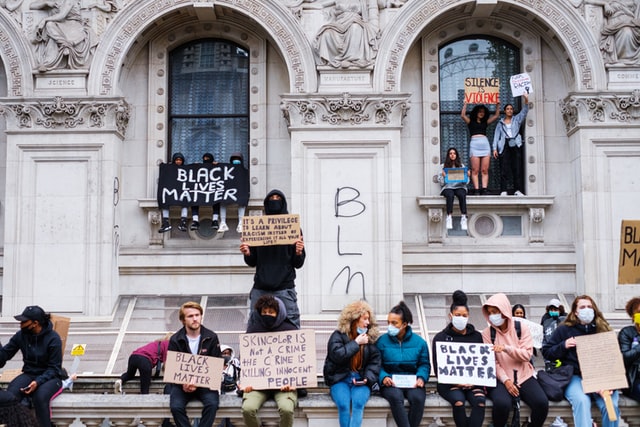The Day Silence became Violence
When the George Floyd protests happened in early June, 2020, it became clear that many Black people from America and around the world had enough. Protestors took to the streets and raised awareness of modern-day systemic racism and violence against Black lives. Black Lives Matter creatives took over our social media, and this time, many brands listened and responded to the subject of social justice. There was good feedback from audiences, some were mixed, and others negative.
For us at picnic, we listened to protesters and responded quickly. Our original plan that week was to promote our new brand launch. However, as the situation escalated we pivoted our focus to make sure we were giving our full support. We watched other brands act quickly during the week of June 1 – 5 in support of the protests. These included Ben & Jerry’s, Nike’s “Don’t Do it Ad, and Lego.

For any company new to social justice, it can feel tricky finding a balance between being authentic and feeling performative. You may even wonder if you should remain silent. However, we feel this is a moment to reflect back on your company values and decide if this is a cause that connects with your team, your message, and your mission statement. Is this a cause that your business can get behind?
There are a number of factors at play when it comes to social justice and your business values. For your benefit, picnic has compiled 4 steps to think about when choosing to support social justice efforts as a business owner.
Why should small businesses speak out on social justice?
We understand how confusing it can be to navigate what’s right and wrong to post when it comes to sensitive social justice movements. Sometimes it may feel like it would be easier for your brand to just leave it alone. However, we’re here to tell you that in the long run, it’s better for your brand to be a part of the conversation.
The reason behind this is that it supports your brand’s credibility to be consistent with your company values. Studies show that companies and brands who have a strong sense of social justice also experience higher rates of brand loyalty and higher profits than those who don’t. People want to support a business they can believe in.
But speaking out on social injustice can be a double-edged sword. If you don’t have the right practices put in place to help your brand take a professional stand, it can cause conflict. Below we’ll provide you with guidelines we’ve created to support businesses who want to take a stand on social injustice.
1. Be genuine on social justice matters
Social media users are now on the radar for brands who are disingenuous with their social justice marketing. An example would be that many companies during pride month don a rainbow flag on their logos. Only to expect people to forget that in the past they may have contributed to homophobic campaigns. People are quick to call this out as performative activism. Even though the intentions of the company may be good, people expect more than small gestures.
There were many social media trends that came out in the subsequent days of the George Floyd Protests. The now infamous Blackout Tuesday black square was posted June 2, 2020, in order to give a pause to the regular ongoings of social media in solidarity with Black lives affected by police violence. However, what happened next was a mixed response from activists online. Many people felt the black square was diminishing the real message of Black Lives Matter. Additionally, it was seen as a performative gesture made by brands to do the bare minimum. Simply saying, if you can’t back it up, don’t post it.
Instead, look back to your values and start to reflect on what this movement means to you, your team and your business. Social media is just a start, so what else can you do and how do you want to be seen future-forward? On June 2, picnic took time to think of our actions before posting anything on social media that day. We decided that instead of posting a black box with the hashtag #BlackoutTuesday, we would speak from the heart about why inclusivity and justice are important to us as a team. Furthermore, we researched important campaigns online and decided to follow the Amplify Melanated Voices campaign of supporting local Black-owned businesses that we cared about. Other businesses that demonstrated a strong and genuine stand were Lego, Nike, Yorkshire Tea, Viacom, and more.
2. Listen to different viewpoints from the groups most affected
It’s easy for your brand to follow in the latest trends, however, if the trend is a result of social injustice, then it’s best to find and listen to the groups who are most affected by it. Brands have been known to fall into a tone deaf approach when it comes to sensitive matters. An example of this would be the infamous Pepsi commercial with Kendell Jenner where she solves police brutality by handing a cop in riot gear a bottle of Pepsi. Are the intentions behind this good? Possibly. But it also trivializes the countless number of victims of police violence. Better focus groups from diverse demographics could have prevented that ad from happening.
Even in Vancouver, we saw companies who wanted to be part of the BLM conversation get criticized for their use of the #blacklivesmatter hashtag in #blackouttuesday posts. People were quick to point out these mistakes and discredit their good intentions for lack of informed research and their inauthenticity.

Our big takeaway from this? Take pause and research different viewpoints before joining an online trend. My favourite places to learn more information about sensitive topics comes from non-judgemental ask forums on Reddit, like r/askLGBT, r/askGayMen, r/NoStupidQuestions. This is where anonymous people from minorities have volunteered their time to help educate you. It provides a wealth of information that can help inform you on what steps to take next.
3. Relate social justice to your business and make it measurable
Throughout these trends, we’ve seen businesses forget that at the end of the day – they are still a business. If they step too far to the far left, they risk losing a large chunk of their audience and become seen as unrelatable.
Ultimately, your business’s social media accounts should share posts about your brand, what matters to your brand, and how it relates to what you sell. Consider first how you appeal to your target audience through shared interests. We recommend that you share your support for social justice efforts that fall in line with your values and your brand’s mission statement as part of a long-term vision for your company.
For example, our clients at Good Space Plans Online decided to continue to express their values in equality and diversity by highlighting Canadian Black, Indigenous and LGBTQ designers throughout the month of June, including George Sully’s Black Designers of Canada.
It’s important to remember that geography has a part to play in your brand’s messaging too. If your company extends past its borders and your reach is far, you will want to adjust your message for international support. If your bandwidth is limited to your city, however, and your reach is smaller, you will want to adjust your message to be relatable to local audiences. Ben and Jerry’s does a great job at this as they try to support local Black Lives Matter charities in their local communities and support dairy farmers of colour. These are measurable and specific practices that relate back to the mandate of these brands.
4. Own up to past mistakes
When companies decide to take a social activist route, they must first look in the mirror. It’s not enough to try to change other people. You must first be the change you want to see in the world.

Larry Fink, CEO of BlackRock Inc, stated, “As a firm committed to racial equality, we must also consider where racial disparity exists in our own organizations and not tolerate our shortcomings.” The truth is systemic racism is in all of our systems. We all have racial biases that need to be addressed and looked at. It doesn’t mean that your company is bad if you’ve made mistakes in the past. But it does mean you should own up to them.
If your company has made mistakes the best way to apologize is by doing these three things according to psychologists:
- Convey remorse. Show that you understand your wrongdoing.
- Show empathy. Explain that you understand why people would be hurt.
- Promise growth. Talk about the measurable and educational practices you will put on yourself to make sure it never happens again.
Note: Do NOT use the culture of the times as a reason when making public apologies. ( e.g. saying that in the 90s people were less politically correct). Do not try to redirect blame. Instead, own up to it and promise that it won’t happen again.
No one is asking for perfection of you or your company. The only thing we can ask of ourselves is that we at least try to do better for the world. The best way to do that is to be honest with ourselves, have uncomfortable conversations, and try to fix any discrepancies we have.
We all have a part to play
When we look back at these times, we can feel proud that we were a part of an important movement. Many of us spoke from the heart. We listened to marginalized groups. We made measurable and specific contributions, and most importantly, educated ourselves to do better.
No company is alone here. We can all contribute a lot of good to society and our communities if we take a more active stance on social issues. By supporting causes that align with your values, you are building your credibility and consistency with your brand message. We know it can be intimidating if you receive criticism, but ultimately the vast majority of consumers support businesses with strong values. Plus, you’ll be contributing to a better, and more equitable world, which is something most brands have never had the opportunity to be part of before.
Do you have questions or feel we missed another step? Feel free to comment below or email us hello@picnicsocial.ca. And remember, Black Lives Matter, LGBT Lives Matter, Trans Lives Matter. ✊🏻 ✊🏼 ✊🏽 ✊🏾 ✊🏿



